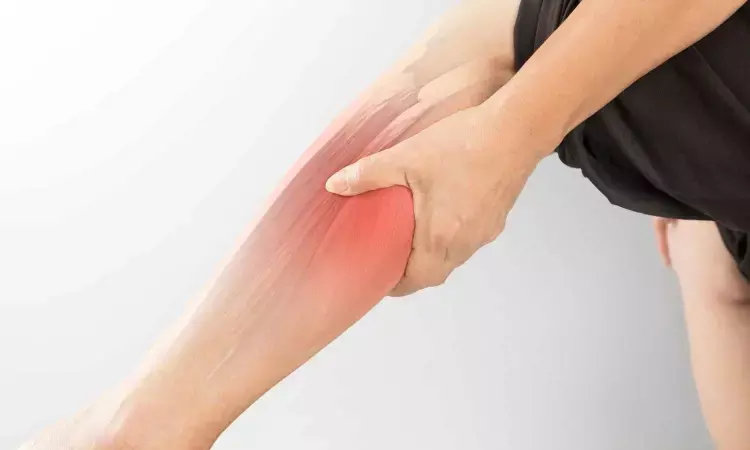- Home
- Medical news & Guidelines
- Anesthesiology
- Cardiology and CTVS
- Critical Care
- Dentistry
- Dermatology
- Diabetes and Endocrinology
- ENT
- Gastroenterology
- Medicine
- Nephrology
- Neurology
- Obstretics-Gynaecology
- Oncology
- Ophthalmology
- Orthopaedics
- Pediatrics-Neonatology
- Psychiatry
- Pulmonology
- Radiology
- Surgery
- Urology
- Laboratory Medicine
- Diet
- Nursing
- Paramedical
- Physiotherapy
- Health news
- Fact Check
- Bone Health Fact Check
- Brain Health Fact Check
- Cancer Related Fact Check
- Child Care Fact Check
- Dental and oral health fact check
- Diabetes and metabolic health fact check
- Diet and Nutrition Fact Check
- Eye and ENT Care Fact Check
- Fitness fact check
- Gut health fact check
- Heart health fact check
- Kidney health fact check
- Medical education fact check
- Men's health fact check
- Respiratory fact check
- Skin and hair care fact check
- Vaccine and Immunization fact check
- Women's health fact check
- AYUSH
- State News
- Andaman and Nicobar Islands
- Andhra Pradesh
- Arunachal Pradesh
- Assam
- Bihar
- Chandigarh
- Chattisgarh
- Dadra and Nagar Haveli
- Daman and Diu
- Delhi
- Goa
- Gujarat
- Haryana
- Himachal Pradesh
- Jammu & Kashmir
- Jharkhand
- Karnataka
- Kerala
- Ladakh
- Lakshadweep
- Madhya Pradesh
- Maharashtra
- Manipur
- Meghalaya
- Mizoram
- Nagaland
- Odisha
- Puducherry
- Punjab
- Rajasthan
- Sikkim
- Tamil Nadu
- Telangana
- Tripura
- Uttar Pradesh
- Uttrakhand
- West Bengal
- Medical Education
- Industry
Diabetic Muscle Infarction- rare complication of uncontrolled blood sugar

Diabetic muscle infarction (DMI) is a rare and serious complication associated with uncontrolled diabetes, characterized by muscle ischemia due to microvascular occlusion. However, the understanding of this condition remains limited, and there is a lack of standardized guidelines for its evaluation and management. In particular, patients with end-stage renal disease (ESRD) face additional challenges in managing DMI, as commonlyprescribed medications may be contraindicated as presented in a case report published in the JCEM Case Reports by Carlos S Botero Suarez and colleagues.
The case involves a middle-aged African American man with ESRD who presented with new-onset pain and swelling in his right lower extremity. The patient's medical history revealed poorly controlled diabetes, a known risk factor for DMI. The clinical presentation and diagnostic workup supported a diagnosis of DMI, emphasizing the importance of considering this uncommon complication in diabetic patients with lower extremity symptoms.
A 42-year-old African American man with a history of poorly controlled diabetes and end-stage renal disease (ESRD) presented with new-onset severe pain and swelling in his right lower extremity. Despite initial concerns of deep vein thrombosis and cellulitis, imaging studies revealed marked enlargement of the right thigh and extensive muscle edema, consistent with diabetic muscle infarction (DMI). The diagnosis was made based on clinical grounds, and a biopsy was not performed. The patient was treated with low-dose aspirin, acetaminophen, and tighter glycemic control. Subsequent follow-up showed improvement in glycemic control and decreased levels of creatinine kinase (CK). However, three months later, he experienced recurrence of pain and swelling in his left thigh. Due to his ESRD, traditional analgesics were not an option. The patient is currently awaiting a kidney transplant.
This case highlights the challenges in managing DMI and the need for individualized treatment approaches for patients with diabetes and ESRD. This case contributes to the limited knowledge surrounding DMI, particularly in relation to its impact on the African American population and patients with ESRD. By sharing this unique case, healthcare professionals gain valuable insights into the challenges faced when managing DMI, leading to improved recognition and enhanced patient care for individuals at risk.
Diabetic myonecrosis is a rare but significant condition that healthcare providers need to be aware of due to the rising incidence of diabetes. Making a diagnosis can be difficult given its wide range of possible causes, but a high level of suspicion coupled with MRI findings can confirm the condition. Muscle biopsy should be reserved for cases where the diagnosis remains uncertain. An accurate clinical diagnosis is crucial in order to prevent unnecessary procedures such as biopsies, antibiotic treatment, or surgery. It may be necessary to expand diabetic education to help patients recognize the symptoms of this condition.
This case report underscores the importance of considering DMI in diabetic patients with lower extremity symptoms, particularly in individuals with additional risk factors such as ESRD. As research continues, further understanding of this condition and the development of standardized treatment guidelines are essential to improve patient outcomes and optimize management strategies for this uncommon diabetic complication.
Reference:
Botero Suarez, C. S., Matos, M., & Suryanarayanan, S. (2023). Diabetic muscle infarction: An uncommon diabetic complication with a lack of standardized treatment. JCEM Case Reports, 1(2). https://doi.org/10.1210/jcemcr/luad018
.
Dr Kamal Kant Kohli-MBBS, DTCD- a chest specialist with more than 30 years of practice and a flair for writing clinical articles, Dr Kamal Kant Kohli joined Medical Dialogues as a Chief Editor of Medical News. Besides writing articles, as an editor, he proofreads and verifies all the medical content published on Medical Dialogues including those coming from journals, studies,medical conferences,guidelines etc. Email: drkohli@medicaldialogues.in. Contact no. 011-43720751


